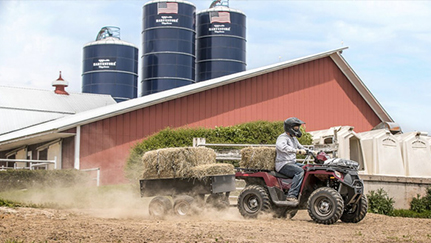Three pillars of ATV/UTV safety
1. What’s legal: Not always safe for ATV/UTV operation
Though specific laws vary by state, many ag states permit ATV/UTV use on some public roadways if the operator is a licensed driver. Just because it’s legal doesn’t mean it’s safe. ATVs/UTVs were built to ride and drive off-road, said Nationwide Powersports Product Manager David Russell. A car or truck driver might not see – and might collide with – these smaller vehicles.
“People often think that if something is legal, it must be safe,” Russell said. “Always be aware of what is permitted by law. Don’t get lulled into safety complacency because something is legal. What’s legal isn’t always safe.”
Begin building a culture of safety with ATVs/UTVs with your workforce by learning the laws and regulations. Then identify ways you can build on them to make sure all employees operating the machines are working safely.
2. What’s smart: The role of common sense with ATV/UTV operation
Smart, safe ATV/UTV operation is a combination of the right safety equipment and know-how along with responsible operator behavior and common sense. Make a practice of keeping the machines off public roadways whenever possible and travel at a safe, smart speed. Instruct all workers to follow these rules without exception.
“Operators may drive the speed limit on the way to work. Then they’ll hop on an ATV/UTV inside a machine shop or storage building and tear out the door at an unsafe speed because they have work to get done,” said Nationwide Agribusiness Senior Risk Management Consultant Brian Hammer. “Especially with the power of many of today’s ATVs/UTVs, that kind of operator behavior can turn tragic in a hurry.”
3. What’s right: With ATVs/UTVs, match job, manpower and horsepower
Hammer recommends training every member of your farm or agribusiness workforce before turning a wheel on an ATV/UTV. Also make sure all operators have the right machines to do their jobs and are prepared to do them responsibly. That includes knowing the machines’ capabilities so they can make safe operating decisions.
"Understand how accessories will affect speed and maneuverability. A sprayer and tanks may make your machine top-heavy and prone to rollovers. Components like brakes, tires, suspension, safety belts and even signal lights are not held to the same safety standards as cars and trucks.” Hammer said. “Make sure you’re pairing man and machine the right way. Never underestimate the importance of common sense.”
Added Russell: “Do you need a turbocharged engine? Maybe, maybe not. Though you may need extra power for certain on-the-job tasks, the most important thing to understand is what ATV/UTV you need for your job and what you’re buying, including what’s under the hood.”
